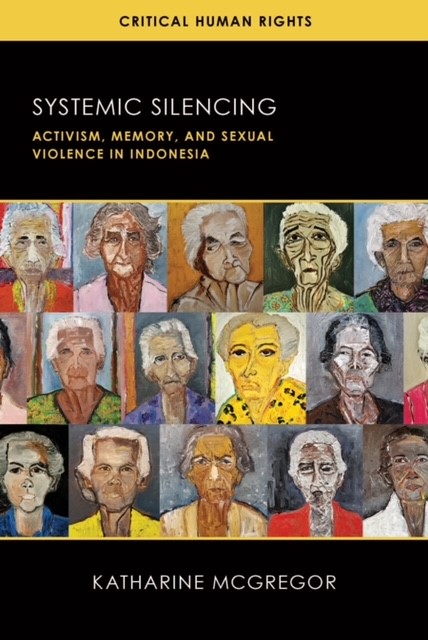Jorien van Beukering
In Systemic Silencing: Activism, Memory, and Sexual Violence in Indonesia (2023), historian Kate McGregor traces the trajectory of activism on sexual violence in Indonesia from the colonial period to the early 2000s. Focusing on Indonesian so-called ‘comfort women’ (women subjected to enforced military prostitution by Japan during the Second World War [WWII]), McGregor argues that the silence that long surrounded these women’s experiences in the 1940s is symptomatic of broader Indonesian attitudes to sexual violence and human rights violations. Lucid and well-written, Systemic Silencing makes a convincing argument that contributes to discourse about transnational activism, memory and sexual violence in Indonesia.
Systemic Silencing contains nine chapters chronologically charting an Indonesian history of sexual exploitation, primarily of women by men, and the development of activism around this. Following an introduction setting out McGregor’s methodological approach, Chapter One examines pre-colonial and colonial practices of concubinage while Chapter Two outlines Japan’s view of Indonesians – women and men – as ‘resources’ to be exploited by the imperial Japanese military during WWII. These chapters foreground Chapter Three’s argument that the Japanese system of enforced military prostitution echoed earlier practices of sexual exploitation of women in Indonesia. Chapter Four analyses memories of the Japanese Occupation in Indonesia and the Netherlands today, concluding that Indonesian national memory is ambiguous about the war while Dutch memory focuses on internment and victimisation.

In Chapter Five, McGregor deviates from the Indonesia focus, considering activism by and on behalf of ‘comfort women’ in South Korea and Japan beginning in the 1980s. In Chapter Six, McGregor demonstrates how this was in stark contrast to the situation in Indonesia, where activism only began to emerge in the late 1990s. Chapters Seven, Eight and Nine unpack the gradual increase in awareness about Indonesian former ‘comfort women’ and activism by them and on their behalf, both in Indonesia and abroad. A short conclusion situates activism about Indonesian ‘comfort women’ within broader discourses of transnational activism and summarises lessons from this case study.
The principal strength of Systemic Silencing is that it not only documents the development of activism around former ‘comfort women’ in Indonesia, but also traces the gradual rise of Indonesian public awareness about human rights abuses and sexual violence (particularly against women). Systemic Silencing cleverly utilises ‘comfort women’ as an example to track developing activism around these broader issues. McGregor engages with a range of activist organisations including the Japan Federation of Bar Associates, Lembaga Bantuan Hukum (Legal Aid), Forum Komunikasi Ex-Heiho, Lila Pilipina, the Asian Women’s Fund, and the Japanese Society for Solidarity with Former Indonesian Comfort Women, to name a few, as well as the work of individual activists Takagi Ken’ichi, Kawada Fumiko and Kimura Koichi, and survivor-activists like Mardiyem. This enables McGregor to delve into the complexities of human rights activism in a country that long considered this a taboo topic. In doing so, McGregor makes salient observations about the needs and aims of activists, which may not always align with those of survivors.
Methodologically, Systemic Silencing combines transnational and comparative approaches. This allows McGregor to juxtapose Indonesian activism around ‘comfort women’ with activism in Taiwan, South Korea, the Netherlands, Japan, and the Philippines, resulting in a novel transnational comparative analysis. McGregor’s approach also takes into account that her topic is inherently emotional: in each country examined she reports shame and stigmatisation of former ‘comfort women’ that continued well beyond the war. Although Systemic Silencing does not systematically document the experiences of former ‘comfort women’ (this is not the book’s focus and has been done elsewhere), McGregor approaches testimonies with care and respect. Enough detail of survivors’ experiences is provided to contextualise the book’s arguments about ‘comfort women’ activism. Contextualisation is part of Systemic Silencing’s methodological approach and McGregor expertly links specific events and experiences concerning Indonesian ‘comfort women’ to national and international issues. For example, in Chapter One she connects pre-colonial concubinage to contemporary Indonesian ideas about patriarchy and the social and familial position of women, while Chapter Four situates Indonesian memory of ‘comfort women’ within the international context of the Cold War, and Chapter Eight highlights internal Indonesian politics in its study of Indonesia’s response to the Asian Women’s Fund.

Throughout the book McGregor also considers activism regarding former romusha and heiho, which forms an interesting comparison with the activism around former ‘comfort women’. This methodological approach enables McGregor to probe the political and social context of each country examined and investigate why activism around ‘comfort women’ developed quickly in South Korea, for example, but more slowly in Indonesia.
Despite its complexity, Systemic Silencing is written with clarity and concision. Chapters average only 20 pages but cover a lot of ground. McGregor has the ability to anticipate which questions the reader will ask, so that the reader is rarely left wondering. Rich endnotes point to further resources for the odd occasion that a question is not fully answered (for me this was regarding the impact of survivors’ experiences on their children). The endnotes demonstrate McGregor has drawn upon a wide range of source material, extending from oral testimonies to popular memory, alternative archives, media, and archival documents. Despite the variety of sources, she has successfully integrated each source type – and the specific challenges of each – into her work to create a convincing and clear history.
Systemic Silencing is an excellent new contribution. Its transnational and comparative approach appeals to a broad readership: readers interested in Indonesian history and activism, transnational activism, the treatment of former ‘comfort women’ in former Japanese-occupied territories (and the Netherlands), national memories of the Occupation, Indonesian activism on human rights and/or sexual violence, and the rise of social histories (or histories ‘from below’) in Indonesia, to name a few. Well-written and convincingly argued, Systemic Silencing offers an innovative approach to histories of sexual violence, memory and activism in Indonesia.
Katharine McGregor. Systemic Silencing: Activism, Memory, and Sexual Violence in Indonesia. Madison: University of Wisconsin Press, 2023.
Jorien van Beukering (j.vanbeukering@uq.edu.au) is a PhD candidate at the University of Queensland, where her research examines identity in unacknowledged persons of biracial heritage from colonial Indonesia.











